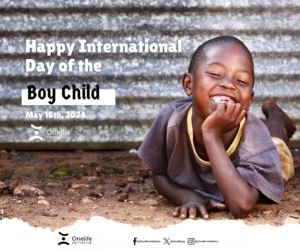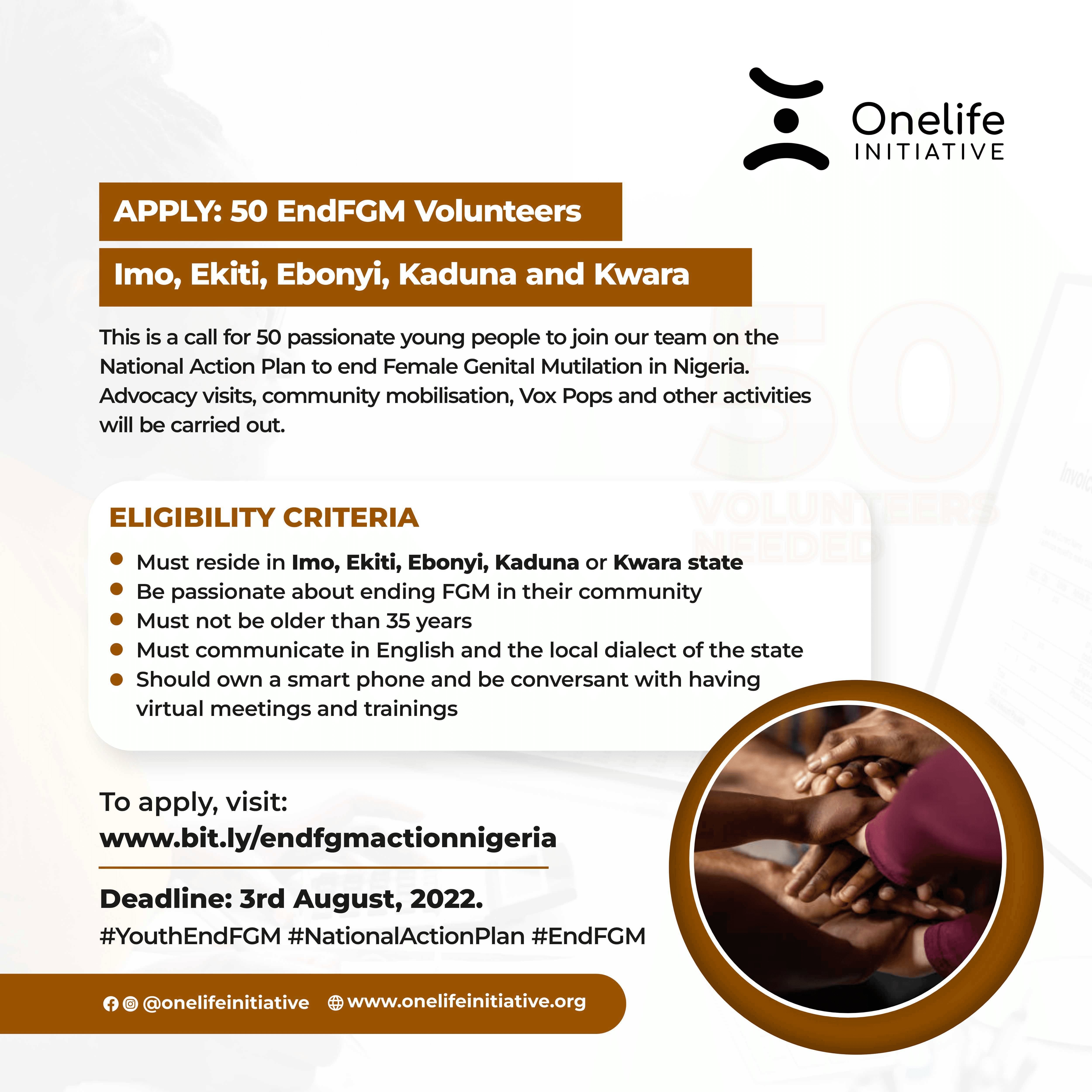It’s not a Female Circumcision Holiday, Spare Her!
In 2016, Onelife Initiative for Human Development through co-ordinated efforts had to intervene in the case of a 3-month old girl who was going to be circumcised by her parents (one of them a lecturer in a private university) in Idanre, Ondo State during the Christmas and New Year break. Since then, we have tried to keep a watch with other like-minded groups to create awareness during the holidays and help parents understand that travelling to the village or city during the holiday is not an opportunity to mutilate/circumcise one’s daughter, sister or female relative. The guide below provides more information and we encourage readers and skeptics to also do their independent findings.
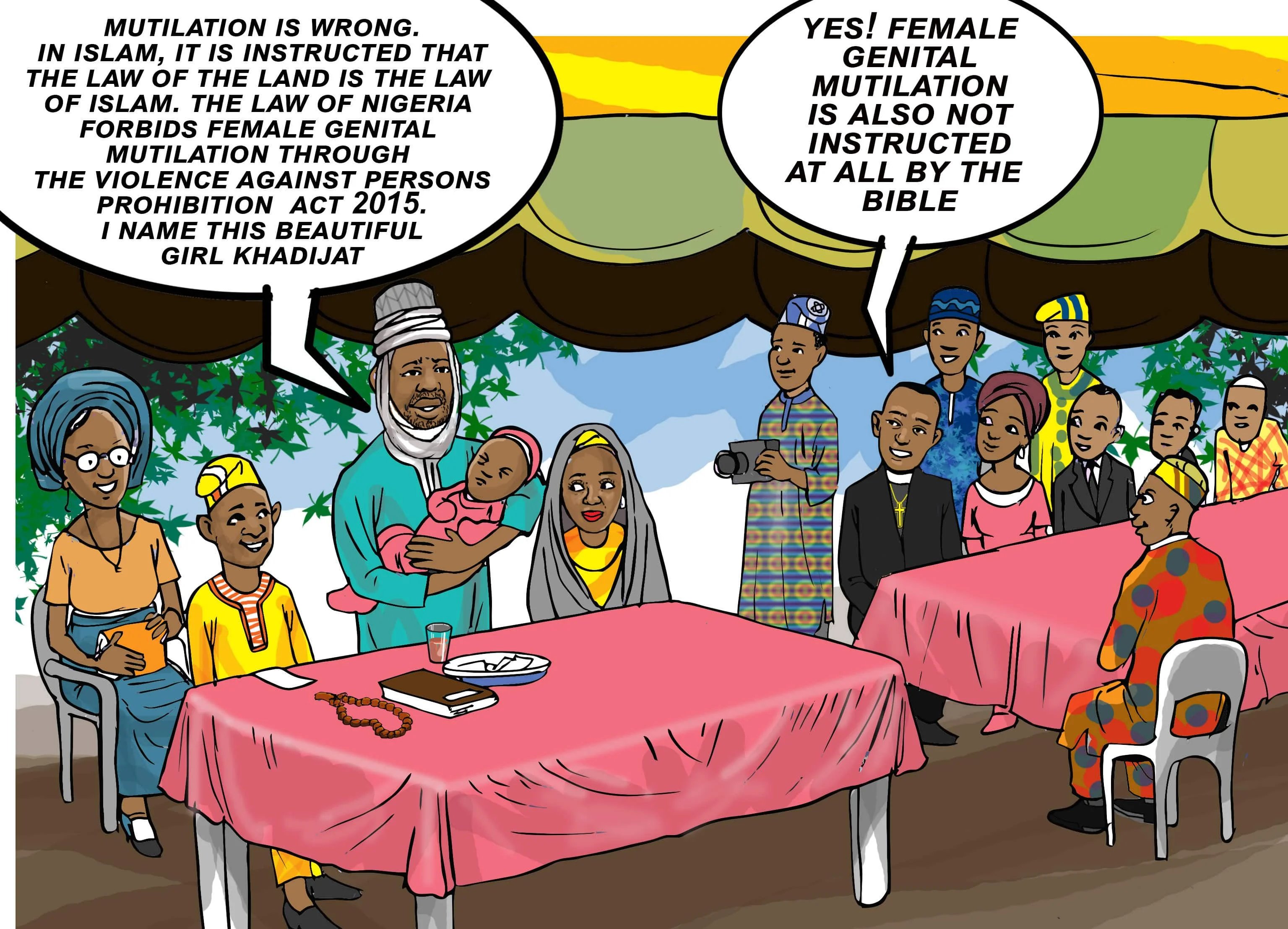
HOW IS FGM DONE AND WHAT ARE THE VARIOUS TYPES?
FGM is done on girls and women depending on the culture. Men and women alike perform it. These cutters could be traditional cutters called Oloolas or in some instances Traditional Birth Attendants (TBAs) and more recently health care providers. Some communities also do it for group of girls or women as a traditional rite of passage to womanhood. In some societies, it is a thing of pride and a natural part of living that is not hidden but hardly talked about. Because cultures differ and methods and approaches through which FGM is done also differs, there are four groups of classification of FGM –
Type I – This practice involves the removal of the clitoral hood (the prepuce), part of the clitoris or the entire clitoris. It is also called Clitoridectomy.
Type II – Also called excision, it is the partial or total removal of the clitoris and the inner lips (labia minora) with or without removal of the bigger lips that surround the vagina (labia majora). This practice is very common in Nigeria.
Type III – This is known as infibulation. It involves removal of all or part of the external female genitalia and then stitching or narrowing of the vaginal opening to leave a small hole for urine and menstrual flow. It is a practice found in some parts of Nassarawa, Balyesa and Kaduna States in Nigeria.
Type IV – This is called unclassified as it captures every other thing done to the externally visible female sex organs (external female genitalia). This includes massaging the clitoris, pricking, piercing, incisions, stretching of the labia or clitoris, introduction of corrosive substances or herbs into the vagina, scrapping of tissue surrounding the vaginal orifice (Angurya cut) or the cutting of the vagina (Gishiri cut).
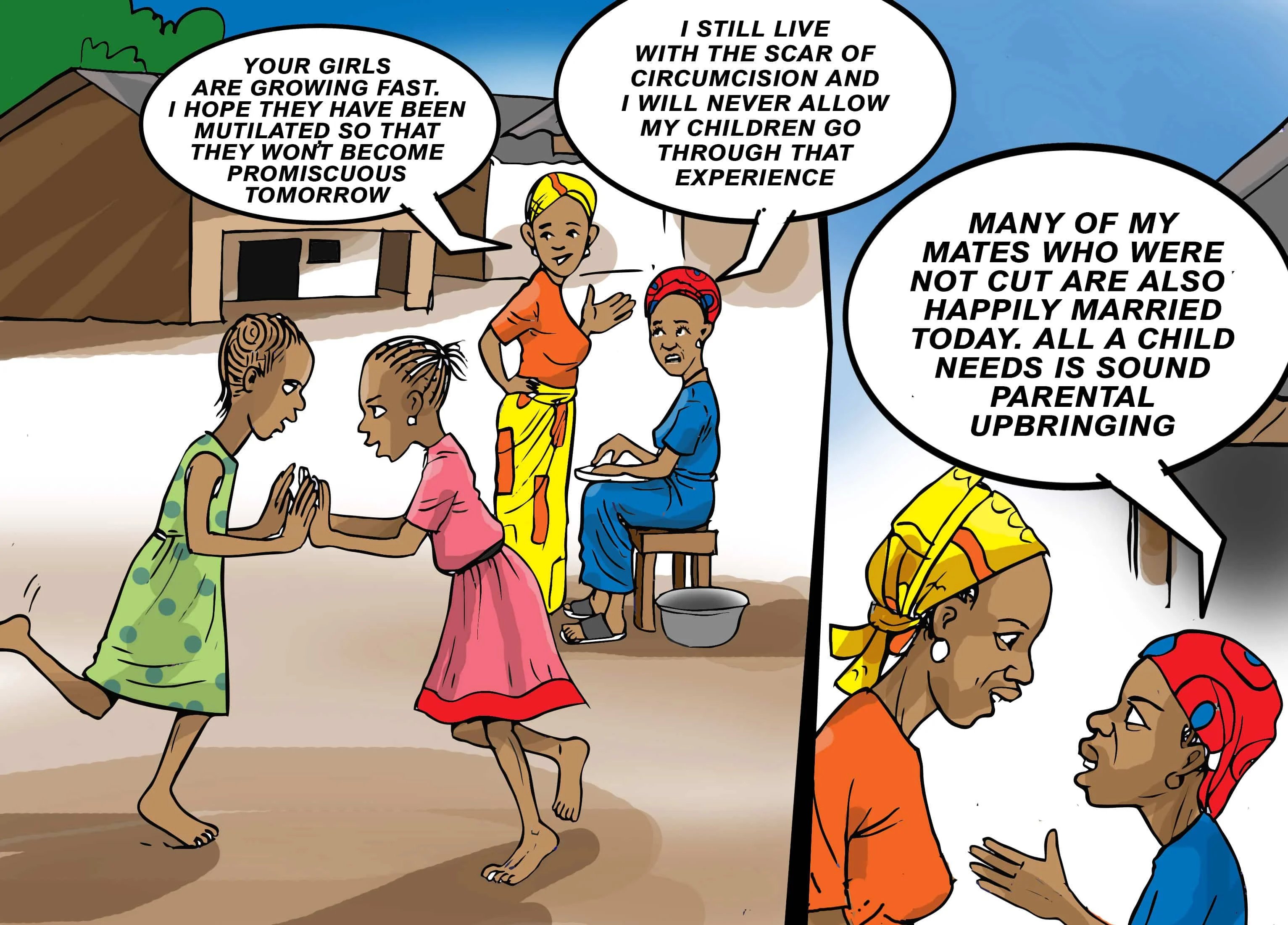
WHAT IS FEMALE GENITAL MUTILATION?
FGM is an acronym for Female Genital Mutilation. It refers to all procedures that involve the partial or total removal of the externally visible female sex organ, or other injury to these organs for cultural or non-medical reasons. It is international categorized as a violation of the human rights of girls and women.
20 million of the 200 million female mutilated globally are from Nigeria − the largest number in one single country. Though called Female Circumcision by a lot of people, it is medically called Female Genital Mutilation/Cutting because of the intensity of damage done during the process and after.
REASONS WHY FGM IS PERFORMED AND THE FACTS
Some of the reasons why FGM is performed in various communities in Oyo state and parts of Nigeria are as follows –
To Preserve Virginity and Control Sexual Urges
Where FGM is a cultural norm, the custodians of this culture believe that an uncircumcised girl can be promiscuous and will not be able to give pleasure to her husband, if she is lucky to find one.
The Truth: There are also circumcised girls who are promiscuous and this is evidence that promiscuity has nothing to do with being mutilated. Besides, it will take two people to have sex. There also should be increased effort to giving boys information on abstinence. On the contrary, the removal of the clitoris make sexual satisfaction almost impossible for most women because the clitoris is the sensitive organ designed for this in women. There are also women who are circumcised and have extramarital affairs. Being committed to a relationship is a decision that FGM does not contribute.
Child Birth and Death
An uncircumcised woman may not be able to give birth and if she does, the head of the child will touch the clitoris during birth and the child will die.
The Truth: There are several women who are not circumcised and are mothers in Nigeria and their child did not die during childbirth. Infertility can be caused by several factors and FGM does not make a woman fertile. It, on the contrary, puts her at risk during childbirth.
A Girl who is not circumcised will itch repeatedly until she is circumcised.
The Truth: Itching in girls and women can be caused by several things. One major cause could be toilet infections. Claims that the itching stopped after circumcision has been traced to some of the herbs used afterwards on the female external genitalia which may have some antibiotic properties. It is however not true that FGM is the solution to itching. Seeing a medical practitioner will enable correct prescription for this.
Religion and Culture
It is a religious injunction stated in the Bible and Qur’an and besides it is an age-long culture that should be preserved.
The Truth: The religious books only made reference to male circumcision and medically there are benefits for this. No part of the Bible or Qur’an has a portion where FGM is encouraged. Culture also changes and is influenced based on new findings. It was once a norm in Nigeria to kill twins, sacrifice hunchbacks, reject Albino children; these no longer happen because of change in culture and new information. FGM is one of the harmful traditional practices that we should do away with.
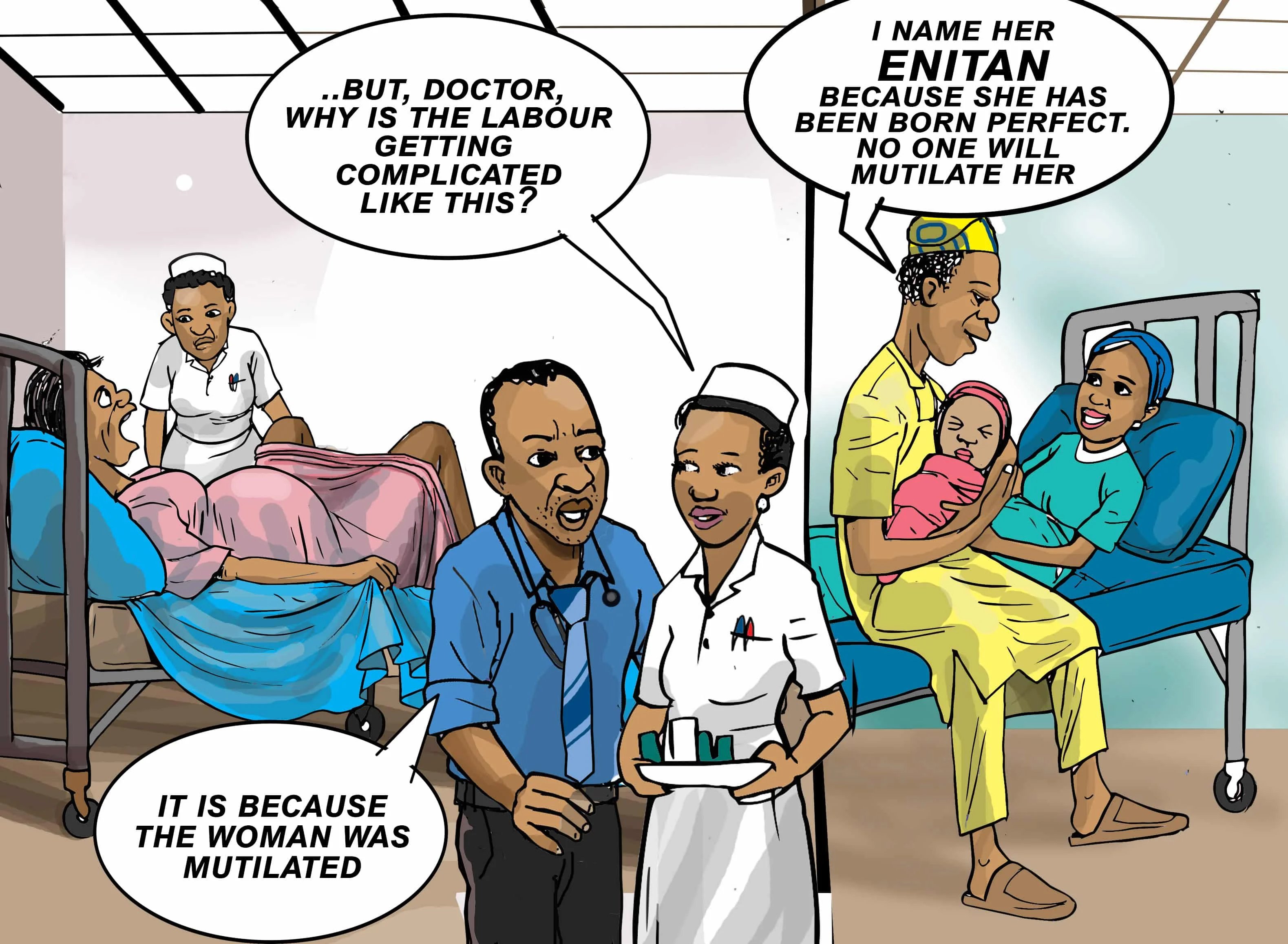
HEALTH HAZARDS OF FGM
Some of the consequences of FGM include the following –
- Shock from bleeding and the possibility of death when this is done on babies
- Painful urination caused by urine retention in the bladder due to infection and also painful menstruation.
- Vesico Vagina Fistula (VVF), that is the continuous involuntary discharge of urine into the vaginal vault. 85% of cases of VVF in Nigeria are caused by FGM.
- There could also be damage to organs like the bladder, anus and urethra by incompetent circumcisers.
- Severe pain during sexual intercourse and loss of interest in sexual activity which can lead to strain in marital relationship.
- Painful child delivery and prolonged labour due to loss of elasticity of the vagina for expansion during conception. This is common with Type III.
- High risk of infection when one instrument is used for multiple FGM procedure.
- It could also lead to depression and feeling of incompleteness by the victim/survivor.
- Development of cysts and keloids at the site of the scar, often causing embarrassment and marital problems, and might require surgery for removal.
WHY CAMPAIGN TO END FGM?
87% of girls age 0-14 and 80% of women age 15-49 were cut by a traditional agent (circumciser, Traditional Birth Attendants and others). They are not medically trained and the instruments used are sometimes crude – broken glasses, razor blade, scalpels etc. 12% of girls and 13% of women were cut by a medical professional (Doctor, Nurse/Midwife and others) and medical professionals and regulatory bodies like the Nigeria Medical Association, National Association of Nigeria Nurses and Midwives, Ministry of Health have also maintained that the practice has no benefit whatsoever. No doctor or nurse is trained to perform female genital mutilation.
The Federal government of Nigeria also recognizes the dangers of FGM and have passed a law that makes FGM illegal. FGM attracts a jail term not exceeding 4 years or a N500,000 fine or both. Passed in 2015, it is called the Violence Against Persons Prohibition Act. Organisations like the World Health Organisation – the organisation that acts on global public health issues and serve as an early warning system for impending public health emergencies declared FGM harmful in 2003. They are also part of the group that have given the world recommendations on what to do to curb public health issues like Ebola, Lassa Fever, Malaria etc. If we took their recommendations on these other issues, why reject that on FGM!
IS FGM ONLY DONE IN NIGERIA?
No. FGM has been documented in 28 countries in Africa & in a few countries in Asia and the Middle East. It is also prevalent among immigrants communities in the United States of America and other European countries. It is mostly done on girls on the 8th day after birth to about age 15 in most cultures. For some it is done before the woman delivers or before a woman gets married. Some culture will not bury a dead woman who is not circumcised. FGM is more prevalent in the southern zones than in the northern zones and one in four women age 15-49 in Nigeria has been circumcised.
I CHECKED AND FOUND OUT THAT I WAS CIRCUMCISED, WHAT DO I DO?
Do not hate your parents, guardian or relatives because of this. Remember that they did it out of their understanding and love to ensure you are protected and grow up chaste even though this is not true. Approach any government or private hospital and ask to see a medical specialist – gynecologist or obstetrician. He or she will be able to access you and make recommendations so that you do not have problems during childbirth or other complications associated with FGM.
NOW THAT YOU KNOW, WHAT CAN YOU DO?
Understand the Issues: Do more research about this practice and you can even read more on it. Ask more questions and you can continue to discuss with us too – contact@onelifeinitiative.org, 08094232675.
Sensitization: We know sexuality is rarely discussed in our communities and families; nevertheless, given the danger of this traditional practice, we need to begin to discuss it. Understand that culture is dynamic − it changes. Facial marks are part of the culture in Yoruba land but the practice is fast fading because there are other means today for identity. Talk about FGM with your peers.
Begin Your Own Campaign: You can become an EndFGM champion; you can begin a campaign in your community by speaking with individuals and group of people. You can sing about the dangers of FGM, write poems and articles to be published in your local media, you can even get on radio or other major means of communication in your community to talk about it in your local language. We will be happy to support you.
For More Information, You can pay us a scheduled visit at 19, Soun Ajagungbade Avenue, off Ladoke Akintola, New Bodija GRA, Ibadan, Oyo State, Nigeria or call 08094232675.


